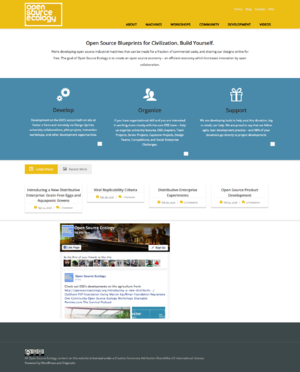Difference between revisions of "Open Source Ecology"
| Line 11: | Line 11: | ||
== <small>'''Description'''</small> == | == <small>'''Description'''</small> == | ||
| − | Open Source Ecology | + | Open Source Ecology is a network of farmers, engineers, architects and volunteers whose goal is the creation of a new model of replicable farm, through the construction of the Global Village Construction Set (GVCS) formed by the 50 industrial machines that the project consider necessary to build a civilization. |
| − | + | The values behind this project are efficiency, ethics and wisdom in a collaborative platform that aims to eliminate the competition, restrictions on materials and resource conflicts that have defined human relations in order to transform them into a world of accelerated innovation with open development, collaborative, interdisciplinary and synergistic thinking. | |
| − | + | The group emerged in 2003, founded by Marcin Jakubowski, with the aim of creating an "open source" economy developing the GVCS, contest winner of the Green Project of the Make magazine, which afterwards would be funded by Shuttleworth Foundation. This practical experiment began in a plot of 5 acres on the outskirts of Madison, Wisconsin. Currently the project is financed through workshops, conferences, traditional donations and crowdfunding. | |
| − | + | In 2006 the project built a prototype of farm in Osborn, before moving their permanent residence in Maysville, Missouri, where the Factor e Farm was settled. The Factor e Farm is a model farm where residents plant and harvest their food, collect water and produce their own electricity with solar panels. In this farm, tools are built and tested to serve in the areas of agriculture, industry, energy, habitat, materials and transport, such as: a concrete mixer, lawn mower, seed distributor, microtractor, oven, milking machine, laser printer, cutter, 3D scanner, industrial robot, solar collector, steam generator, or wind turbine, among others. In 2011, the first replica of the Global Construction Set was carried out, which was since stablished in Baltimore, Maryland, and Dallas. | |
== <small>'''Links'''</small> == | == <small>'''Links'''</small> == | ||
Latest revision as of 22:39, 10 June 2017
Self-portrait
The mission of Open Source Ecology (OSE) is to create the open source economy.
An open source, libre economy is an efficient economy which increases innovation by open collaboration. To get there, OSE is currently developing a set of open source blueprints for the Global Village Construction Set (GVCS) – a set of the 50 most important machines that it takes for modern life to exist – everything from a tractor, to an oven, to a circuit maker. In the process of creating the GVCS, OSE intends to develop a modular, scalable platform for documenting and developing open source, libre hardware – including blueprints for both physical artifacts and for related open enterprises.
The current practical implementation of the GVCS is a life size LEGO set of powerful, self-replicating production tools for distributed production. The Set includes fabrication and automated machines that make other machines. Through the GVCS, OSE intends to build not individual machines – but machine construction systems that can be used to build any machine whatsoever. Because new machines can be built from existing machines, the GVCS is intended to be a kernel for building infrastructures of modern civilization. (http://opensourceecology.org/about-overview/)
Description
Open Source Ecology is a network of farmers, engineers, architects and volunteers whose goal is the creation of a new model of replicable farm, through the construction of the Global Village Construction Set (GVCS) formed by the 50 industrial machines that the project consider necessary to build a civilization.
The values behind this project are efficiency, ethics and wisdom in a collaborative platform that aims to eliminate the competition, restrictions on materials and resource conflicts that have defined human relations in order to transform them into a world of accelerated innovation with open development, collaborative, interdisciplinary and synergistic thinking.
The group emerged in 2003, founded by Marcin Jakubowski, with the aim of creating an "open source" economy developing the GVCS, contest winner of the Green Project of the Make magazine, which afterwards would be funded by Shuttleworth Foundation. This practical experiment began in a plot of 5 acres on the outskirts of Madison, Wisconsin. Currently the project is financed through workshops, conferences, traditional donations and crowdfunding.
In 2006 the project built a prototype of farm in Osborn, before moving their permanent residence in Maysville, Missouri, where the Factor e Farm was settled. The Factor e Farm is a model farm where residents plant and harvest their food, collect water and produce their own electricity with solar panels. In this farm, tools are built and tested to serve in the areas of agriculture, industry, energy, habitat, materials and transport, such as: a concrete mixer, lawn mower, seed distributor, microtractor, oven, milking machine, laser printer, cutter, 3D scanner, industrial robot, solar collector, steam generator, or wind turbine, among others. In 2011, the first replica of the Global Construction Set was carried out, which was since stablished in Baltimore, Maryland, and Dallas.
Links
URL: http://opensourceecology.org
Wayback Machine: https://web.archive.org/web/*/http://opensourceecology.org
Wikipedia: https://es.wikipedia.org/wiki/Open_Source_Ecology
